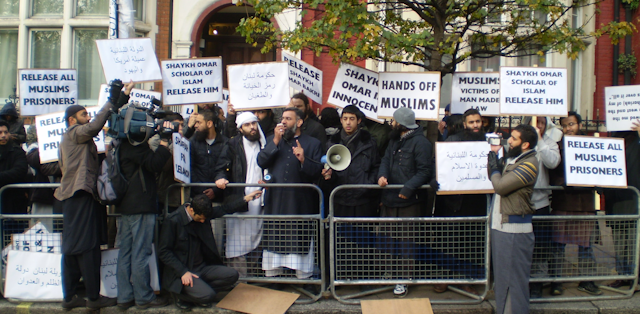Before the extremist preacher Anjem Choudary was released from prison in Britain on October 19, many commentators were getting nervous. It’s hard to fault them for their anxiety. Choudary and his band of al-Muhajiroun (Arabic for “the Emigrants”) fanatics remain among the UK’s most reviled – and marginalised – figures.
For over 20 years, they have tried to establish an Islamic caliphate in Britain. More recently, a number of them have been implicated in political violence and joined the Islamic State in Iraq and Syria (ISIS).
I know how despised al-Muhajiroun are in Britain because I spent years hanging out with them, researching them for my new book The Islamic State in Britain. Between 2010 and 2015, I visited Choudary and his fellow activists on numerous occasions, breaking bread with them in kebab shops, observing their protests and street preaching, and interviewing them.
Among the many things I learned is that al-Muhajiroun’s most persistent activists, people like Choudary and Mizanur Rahman, who was also convicted of supporting ISIS and will soon be released from prison too, rarely leave their activism following incarceration.
If anything, prison reinforces their commitment to the cause. They see their “repression” as equivalent to the sufferings of the Prophet Muhammad and his followers when they were persecuted during the early years of Islam.
“I have done nothing compared to the messengers of old,” one persistent activist, who spoke to me on condition of anonymity, told me, after spending years in prison for a protest gone awry. “The Prophet Muhammad and his companions were boycotted for three years … They were killed … So if I’m on their path, then whatever hardships and whatever consequences they faced, my road is the same.”
A history of rebuilding
By 2008, this person, and other leading activists were incarcerated for their activism. In response, al-Muhajiroun laid low for a while, avoiding the provocative activism and publicity that made it famous. But the network did not collapse. Instead, led by Choudary, who avoided prosecution at the time, activists continued to meet and indoctrinate each other in small study circles called “halaqahs”.
Within a couple of years, the other leading activists finished their prison sentences, allowing them to reengage with Choudary and their fellows. Their reengagement sparked a revival in al-Muhajiroun. In rebuilding their network, activists minimised their public profile, focusing more on “da’wah” (preaching) than incendiary protests designed to capture media attention.
Read more: Wannabes, loudmouths, terrorists? A history of al-Muhajiroun
But soon they returned to public attention, organising a number of high-profile protests under the banner of new spin-off groups such as Islam4UK and Muslims Against Crusades, which have also since been banned by the British government. By autumn 2010, when I began my field work, the activist network was back, stronger than ever.

None of this means that al-Muhajiroun is destined to rise again, phoenix-like after Choudary’s release from prison. Following the group’s ill-advised decision to embrace ISIS in the summer of 2014, which led to Choudary’s imprisonment, British authorities largely dismantled the network. To be sure, al-Muhajiroun’s own history shows it can rebuild. But today it is weaker than it was in 2008, before its first renaissance.
Choudary, Rahman and other persistent activists will remain under close government surveillance following their release from prison, banned from using the internet and subjected to curfew. Without access to the internet, and the ability to meet with their supporters, they will find it harder to rebuild al-Muhajiroun in 2018 than they did in 2009.
Read more: How can Anjem Choudary be stopped from radicalising other prisoners?
Meanwhile, after ISIS’s failed reign of terror in Iraq and Syria and the tragic terrorist attacks in the UK in 2017, at least one of which was led by a former al-Muhajiroun activist, Khuram Butt, Choudary and his companions find themselves even more marginalised from Britain’s diverse Muslim communities.
Choudary’s release from prison underscores the challenges facing British authorities in dealing with a surge of similar cases and in policing al-Muhajiroun’s brand of provocative activism in one of the world’s great democracies.
Best offence, a good defence
For all the outrage the network’s activists have generated for marching against British soldiers returning from Afghanistan, burning replicas of the poppy flower on Armistice Day, and creating “Muslim patrols” to enforce “shariah law zones” in London, the heart of their activism – preaching and protesting – is legal.
Unless the authorities are willing to stop activists from meeting in small groups and proselytising on city streets, a questionable undertaking that would violate the civil rights of these British citizens, it may not destroy what remains of the activist network.
But there is good news. One of the best “weapons” Britain has in countering this extremist narrative are British Muslims themselves, who overwhelmingly reject al-Muhajiroun’s vision. This includes many former activists who left the network and its radical ideology behind.
I interviewed a number of these former activists. They left for different reasons. Some grew tired of working for the seemingly impossible task of establishing the caliphate in Britain. Others became fed up with Choudary’s dogmatism and leadership. Still others simply matured out of the group through parenthood and other adult responsibilities.
Irrespective of their motives, they were glad to have left. “Thank God I did leave because I’m fairly successful in what I do now,” one of them told me. “After I got out of there, I furthered my career and got married. I have kids and stuff. Life is a lot more interesting now.”
Another common trait among these former members of al-Muhajiroun, one that many authorities have not yet grasped, is that they have the knowledge, and often the desire, to counter the group’s message to vulnerable young Britons – whether that message is conveyed online or in Hyde Park. Sometimes the best offence is a good defence.

